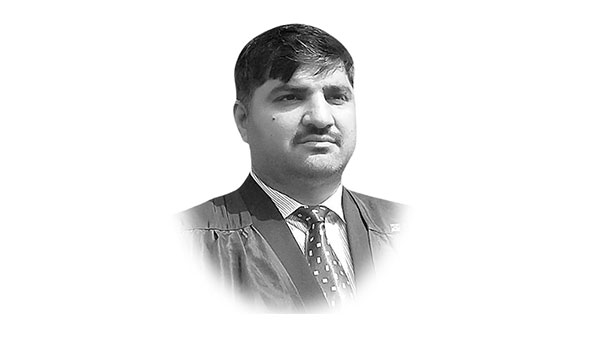Constitution, military & contemporary political stalemate
CONSTITUTION is the composite of some broad fundamental principles through which various governmental institutions are established and their powers and functions are defined so as to avoid any clash among these institutions.
Pakistan had had three Constitutions – 1956, 1962 and 1973. The 1973 Constitution was held in abeyance twice but not abrogated due to Article-6 of the Constitution.
It is worth mentioning that the concept of sovereignty or supremacy is defined in every constitution of a country according to socio-cultural, historical, religious, ethnic and security dynamics. It is, therefore, not absolute across the world.
In Pakistan, the Preamble of 1973 Constitution defined the concept of sovereignty/supremacy as: “Whereas sovereignty over the entire Universe belongs to Almighty Allah alone, and the authority to be exercised by the people of Pakistan within the limits prescribed by Him is a sacred trust; And whereas it is the will of the people of Pakistan to establish an order; Wherein the State shall exercise its powers and authority through the chosen representatives of the people; Wherein the principles of democracy, freedom, equality, tolerance and social justice, as enunciated by Islam, shall be fully observed, wherein the Muslims shall be enabled to order their lives in the individual and collective spheres in accordance with the teachings and requirements of Islam as set out in the Holy Quran and Sunnah.”
The analysis of this text shows that: a) Allah is supreme in religious context; b) People are sovereign in legal context; and the Authority shall be exercised by people’s elected representatives as a sacred trust in the light of Hudoodullah (Limits of Allah); c) Or in simple words, they will exercise it in the light of Holy Quran and Sunnah of the Last Prophet (S.A.W) & d) These elected representatives shall promote a democratic culture based upon Islamic concept of democracy, freedom, equality, tolerance and social justice.
This raised several questions on the role of politicians in Pakistan that: a) Have they exercised their authority as sacred trust; b) Are they devoted to flourish a true democratic culture in Pakistan; c) Are they showing and promoting tolerance in the political system of the country; d) How much did they utilise their potential to introduce social justice in the society; & e) Have ever they bother to hold themselves accountable to their electors; f) Do they lead their life according to the golden teachings of Holy Quran and Sunnah?
The answers of the readers and audience of this piece of writing can give. It is also manifested that the people are legally sovereign and authority on their behest will be exercised by their representatives sitting in Parliament.
Now it is the political, moral, legal, constitutional, national and religious obligations of each representative of a common Pakistani to hold office as public trust.
Unfortunately, the political leaders never bothered to respect the sanctity of the Constitution of Pakistan, of Parliament and, above all, that of vote of the poor-tax-payers.
They did not learn from the past politico-constitutional history of the county. They have myopic approach towards the security of the country.
They forgot the recent chronic security culture in the country, region and world in the post-September 2001.
It is very ironic that political leaders in Pakistan always tried to convert Parliament — a democratic forum to resolve political and constitutional issues through debates keeping in view welfare of the electorate, ethical considerations, codal and constitutional formalities and regional and global security culture – into pandemonium and forum of personal attacks – ranging from using abusive language to physical assault on each other and on the presiding officers of legislature.
The glaring example from the past is the physical attack on Shahid Ali – Deputy Speaker in East Pakistan – through microphone in September 1958 which caused his death after some days; led to political impasse which culminated at imposition of Martial Law in October 1958.
It needs to highlight the fact that at times the military leadership did not ask the parliamentarian to attack the Speaker and to change the legislature into a battle-field.
The non-compromising and non-conciliatory approach among political leaders of East and West Pakistan resulted into civil war and ultimately led to cesession of United Pakistan in December 1971.
Role of the external forces cannot be ruled out. Later on, the united opposition movement against Zulfikar Ali Bhutto’s regime led to imposition of Martial Law.
The defects in domestic policies of his regime cannot be ignored, especially the formation of the Federal Security Force to victimise his political opponents.
However, his service to make Pakistan an invincible country by launching a nuclearisation programme is unforgettable and unmatchable.
The political development during 1988-99 was nothing except politics of confrontation and politics of foul play.
History repeated itself and again all political parties – with different manifestoes — turned their guns against Pakistan Tehreek-e-Insaf at national and provincial levels.
The PTI-led Federal Government was on ventilator because it lacked a simple majority to form a government.
Later on, it formed a government with the help of other allied political partners who later on removed Besaki (crutch) from PTI which led to collapse of the federal government and successful passage of Vote-of-No-Confidence against the government.
It is also pertinent to mention that Chairman PTI Imran Khan neglected his ideological workers and included such personalities – majority of whom had foreign nationalities. Simply, either they were made-in America, made-in Canada, or made-in UK.
—To be continued.
—The writer is Chairman, Department of Political Science, ICP, & Member of Editorial Board of Journal of Wallacea, University of Western Australia.










